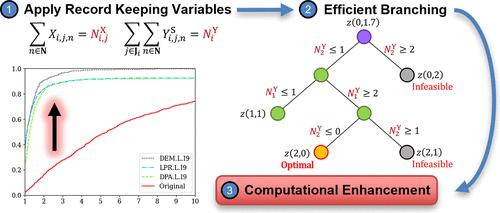使用记录变量的连续生产调度 MILP 方程
IF 3.9
3区 工程技术
Q2 ENGINEERING, CHEMICAL
引用次数: 0
摘要
混合整数线性规划(MILP)生产调度模型的大多数求解方法都是针对批处理过程开发的。在本文中,我们在离散时间连续生产调度 MILP 模型中采用了整数变量,即记录保持变量 (RKV),从而促进了高效分支,并大大缩短了求解时间。我们首先介绍不同类型的 RKV,并确定哪一类 RKV 最有效。其次,我们探讨了分支的优先级,并证明相对于其他二进制变量,优先考虑 RKV 的分支可进一步提高计算效率。接下来,我们分析了系统属性,如任务和单元利用率,以确定在特定 RKV 上确定分支优先级是否会带来更多计算改进。我们的计算结果表明,建议的重构与实施分支优先级相结合,可显著改善连续生产调度 MILP 模型的计算性能。本文章由计算机程序翻译,如有差异,请以英文原文为准。

Continuous Production Scheduling MILP Formulations Using Record Keeping Variables
Most solution methods for mixed-integer linear programming (MILP) production scheduling models have been developed for batch processes. In this paper, we employ integer variables, referred to as record keeping variables (RKVs), into discrete-time continuous production scheduling MILP models that facilitate efficient branching and lead to substantial reductions in solution time. We first introduce different types of RKVs and determine which class of RKVs is the most effective. Second, we explore branching priorities and demonstrate that prioritizing branching on RKVs, relative to other binary variables, leads to further computational improvements. Next, we analyze system attributes, such as task and unit utilization, to determine if prioritizing branching on specific RKVs leads to additional computational enhancements. Our computational results show that the proposed reformulations, in combination with implementing branching priorities, lead to significant computational improvements of continuous production scheduling MILP models.
求助全文
通过发布文献求助,成功后即可免费获取论文全文。
去求助
来源期刊

Industrial & Engineering Chemistry Research
工程技术-工程:化工
CiteScore
7.40
自引率
7.10%
发文量
1467
审稿时长
2.8 months
期刊介绍:
ndustrial & Engineering Chemistry, with variations in title and format, has been published since 1909 by the American Chemical Society. Industrial & Engineering Chemistry Research is a weekly publication that reports industrial and academic research in the broad fields of applied chemistry and chemical engineering with special focus on fundamentals, processes, and products.
 求助内容:
求助内容: 应助结果提醒方式:
应助结果提醒方式:


